The Posthuman Gaze – Interview with Studio ThinkingHand
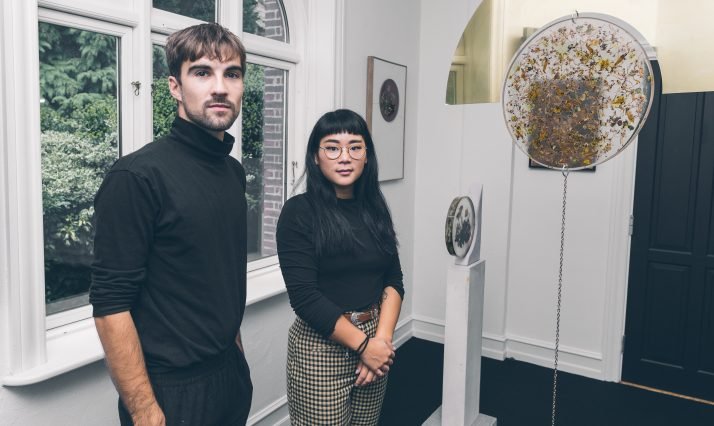
Studio ThinkingHand – Seeing the World through a Posthuman Gaze
Studio ThinkingHand is a Danish-Australian artist duo, consisting of Rhoda Ting and Mikkel Dahlin Bojesen, seeking to embody and apply a Posthuman gaze, through diffracting various gazes across time, spaces, perspectives, species and scales and investigate a movement beyond Humanism. We spoke with the imaginative and investigative partners.
It is quite a sunny afternoon and I am waiting in a cafe, excited to meet the couple behind the art collective Studio ThinkingHand. I am greeted with enthusiasm and great energy by two truly interesting young people, with backgrounds in mental health (Rhoda Ting) and art history and theology (Mikkel Dahlin Bojesen). Speaking about topics such as posthumanism, their recent projects, sustainability and the future of the World it is clear that Mikkel and Rhoda have extensive knowledge to draw upon and are really passionate to share their thoughts.
I start by asking them how the concept of their latest solo exhibition AMONGST RUINS came to be.
Rhoda: I think it came about through humbling lessons from nature. A couple of years ago, we had this initial idea to preserve mushrooms in epoxy as a way to somehow visually pause time, but it was the first time that we tried to use epoxy, so we didn’t know what was going to happen exactly. We thought it was just going to preserve the natural elements inside, but then we realized that the mushrooms had gone into an intricate reaction with the epoxy.
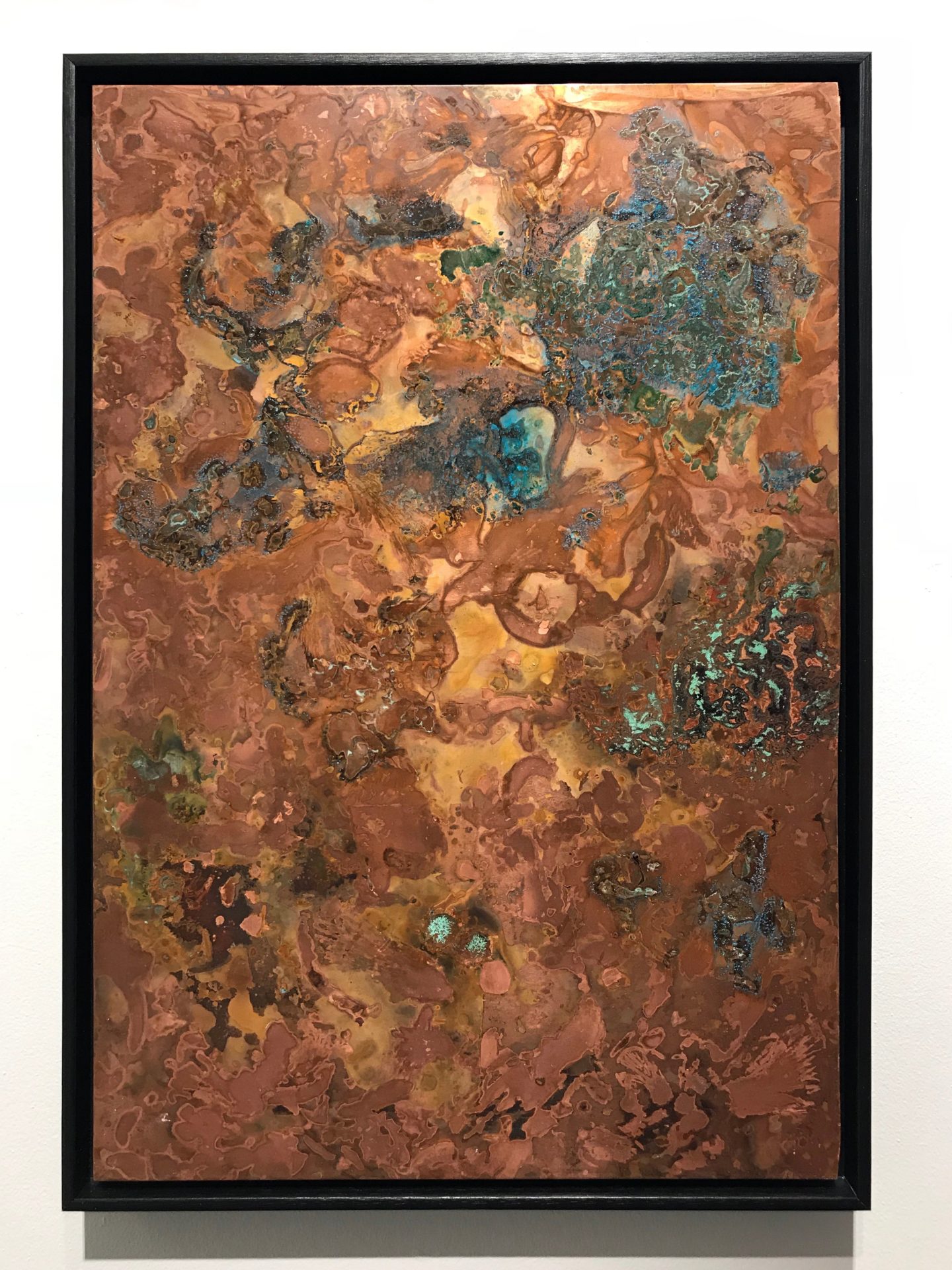
Rhoda: To a great extent, it was actually the mushrooms who became painters of the portrait, with a tiny bit of facilitation from our side. We became very excited about this co-creation. For a group exhibition during 3daysofdesign in Copenhagen, Spring 2018, we wanted to scale up the process. We went out with a preconceived idea to collect specific mushrooms and lichens on a warm spring day – The only problem was that of course these mushrooms were not there as it was not the right season for them to fruit. Our carefully constructed production plan was out of our control!
Mikkel: We came back to the studio empty handed, a bit embarrassed and very stressed. However we soon realised that we were not relating to the world around us, we were forcing our human product driven objectives onto it – essentially, embodying an old paradigm Humanist approach. We went back out into the forest, now searching for the unknown to see what is actually happening around us today, instead of looking for specific specimens. We learned that it is difficult and entitled to regard nature as a kind of shop that always has wares on its shelves. It’s a finite and delicate system, that we as humans with our current worldview might not understand fully.
Rhoda: It’s through realisations like this that we have learned and still are learning to relate to nature in another way. Let’s go out there and be in a dialogue with nature. Let’s observe, intra-act (neologism introduced by feminist theoretician Karen Barad) and see what is happening. As you might expect, there was so so many things happening in the forest. We had overlooked them, because we were looking for something in particular. We had to battle our own expectations, control and product driven mindsets and stay curious.
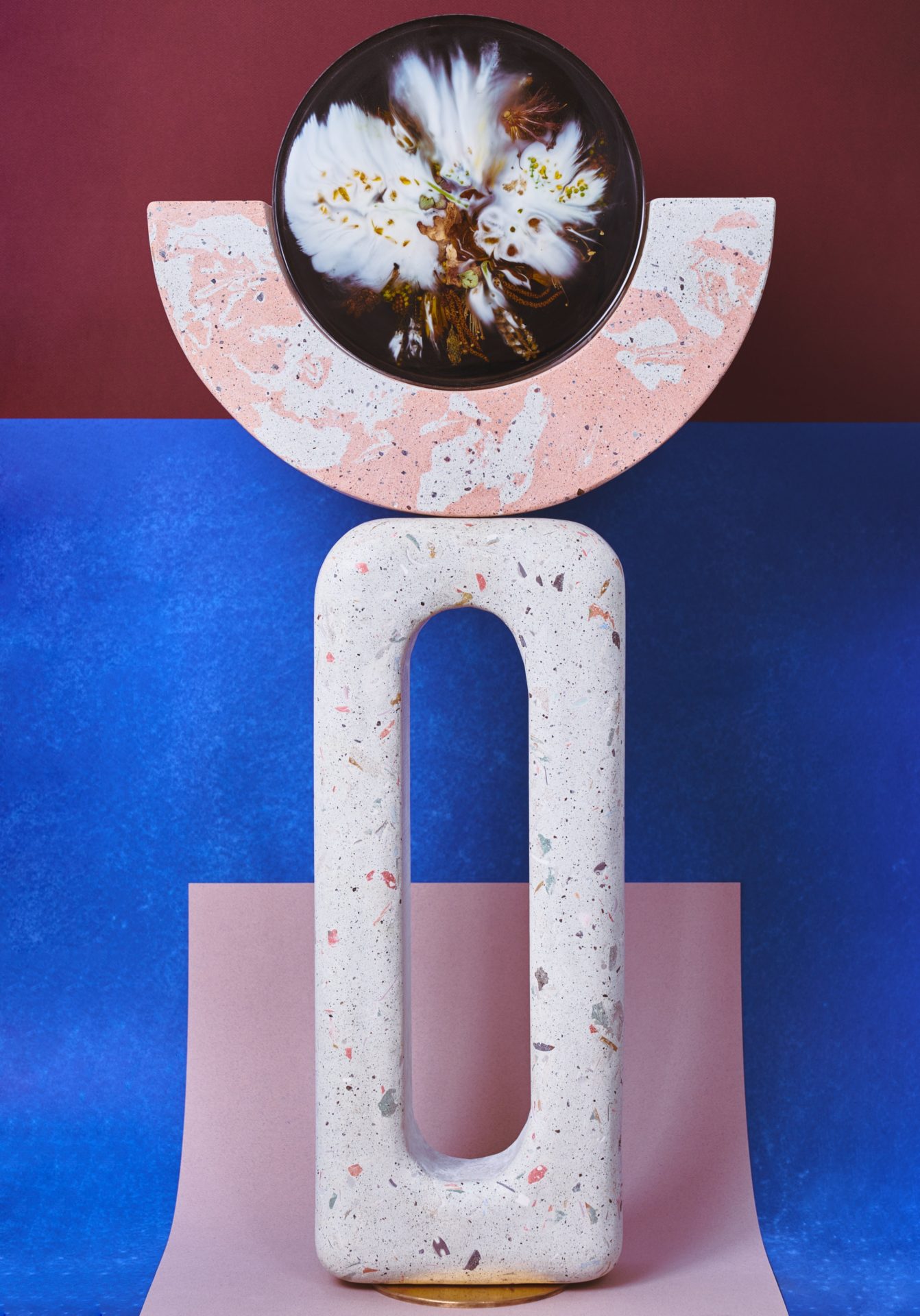
Rhoda: The work didn’t turn out exactly like we wanted but that was even better because it was something we never would have thought of or could have done ourselves and we learnt so much along the way about how living material reacts with exothermic reactions and epoxy. We work with natural materials and processes and are striving towards a shift in the current human-nature relationship. What is decay and ruins to the human eye, might be a lifegiving aspect for other species and entities. In the production of the first works for the exhibition, we learned a lot about ourselves, our philosophy and our perspective.
Mikkel: And we need to trust that process. There is something essential in shaping it, working with it, materializing it – embodying this philosophy of a post-human gaze where the basic unit of reference of what it is to be human is something else today than it used to be.
Rhoda: AMONGST RUINS is very much a journey into the human fear of the temporal aspects of life – everything ends up collapsing at some point, but it doesn’t mean that it is gone, it has merely transformed, and begs the question: From who’s perspective is something a ruin? The concept of a ruin comes from a human frame of value and marks the collapse of the promise of permanency. The ruins of one entity can be an absolute gem for other species on this planet – as one big self-organizing organism. What is the crisis of man? What are we trying to sustain? How has advanced capitalism and the promise of growth distorted our relationship to nature?
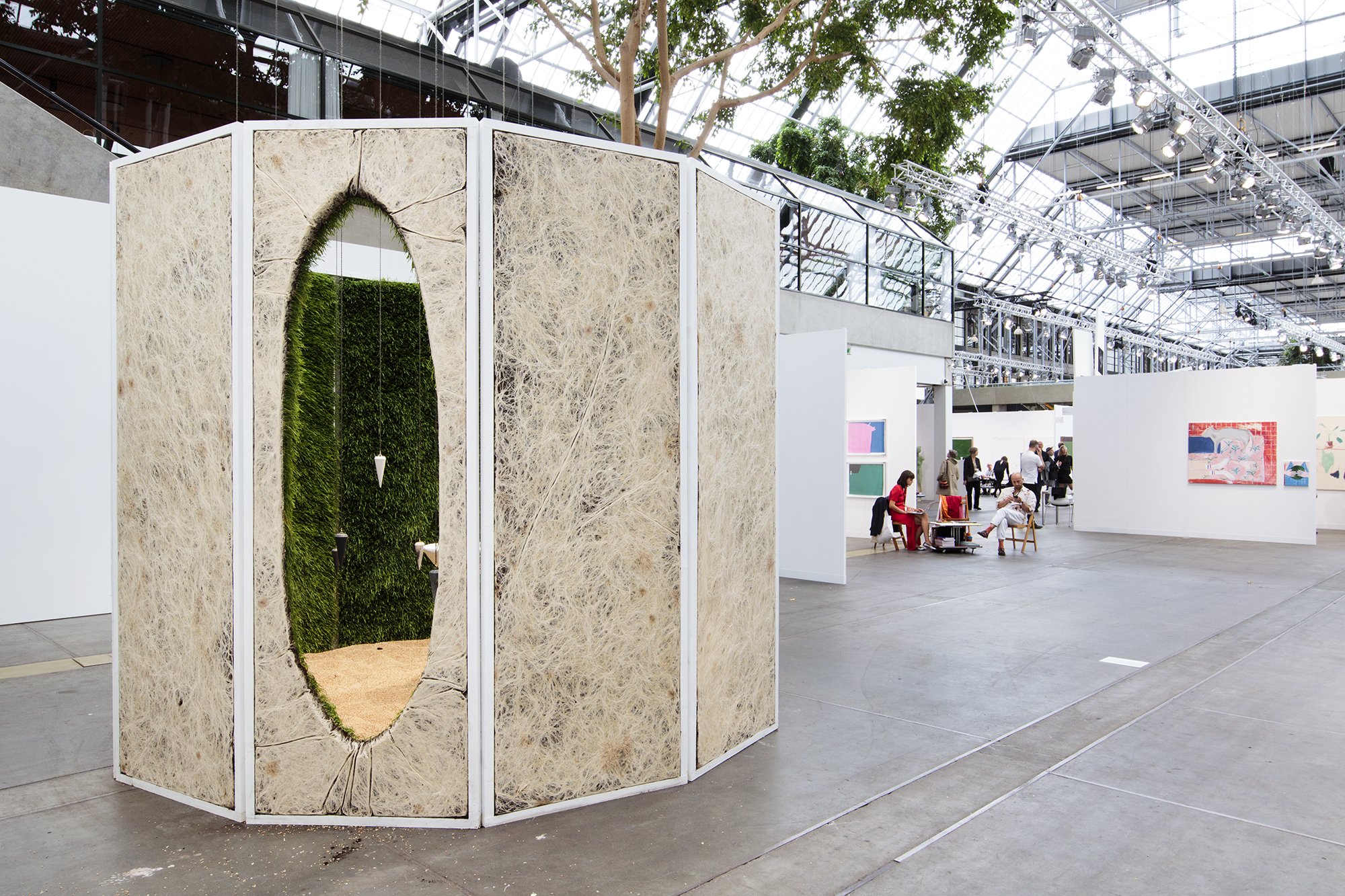
Transforming the human gaze
Probing a bit deeper into the work behind AMONGST RUINS, more aspects start to show of what Rhoda and Mikkel categorizes as a posthumanist research-based process, and what thoughts go into the pair’s artistic endeavors.
Mikkel: We are very inspired by the diversity and complexity of nature, and we as humans can never replicate these intricate systems and reactions. Every time we try, we end up with a kind of cultural representation instead of the real thing. In Studio ThinkingHand we try to co-create with nature and facilitate events that visualizes and exhibits this polyphonic entanglement. We think that this open and curious collaboration with other-than-human-entities can be a gateway into trying to understand the changing role of the human force on the planet. We don’t have any answers, but we have a lot of questions.
Rhoda: We found out about the complexity of mushrooms and it opened our eyes to the fact that humans are not only intra-acting with other humans but with a complete system around it. What kind of conversations can happen outside the human-to-human frame, and what interactions can be found there? What can we learn from meeting a mushroom?
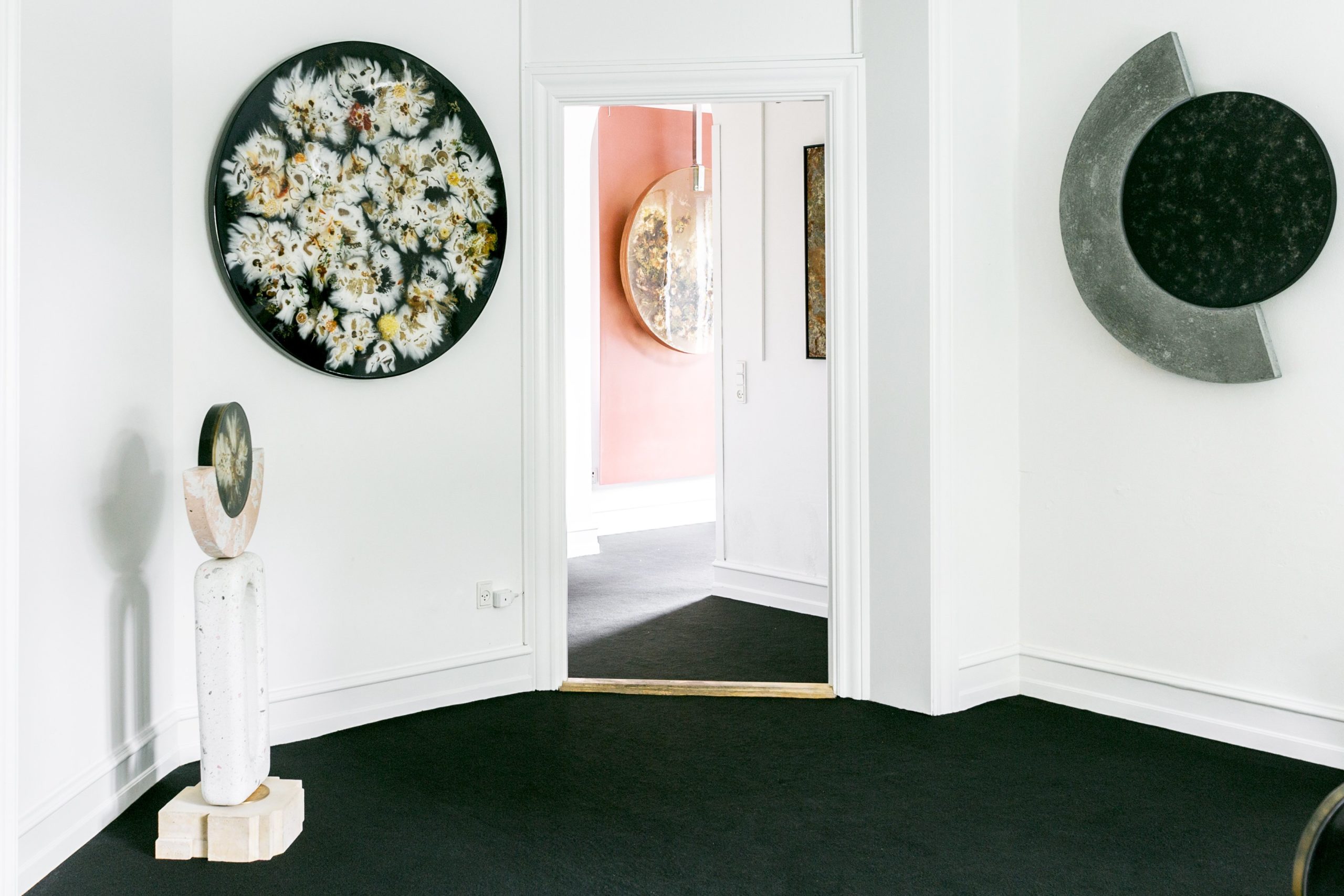
Mikkel: The life-cycle, metabolism and scale of a mushroom is different to ours in so many ways yet familiar. Engaging in an open, abstract, and borderless dialogue with our fellow beings can teach us a great deal about ourselves and how we relate to ‘otherness’ both outside and within our species – from gender, class and race to empathy, sustainability and vitalism.
Rhoda: In our current society we have an overshadowing human-centeredness, to the extent that we believe ourselves to be at the top of the ladder of nature. We have been brought up in a dualistic way that has come to be known as the ‘nature-culture continuum’, where we see the human race as something apart from or greater than our natural origin. Through our practice we try to challenge this notion, using ourselves as a kind of subject so we can sense it in our own body. Bodies amongst bodies entangled in, through and across matter and value.
Mikkel: There are many ways to engage in the notion of post-humanism, for instance politics, ecology and economics. However, we use the arts as a point of departure, as it is firmly grounded in aesthetics and provides a sensuous and tangible entry point to the predicament. Aesthetics is more than a mere cultural relation to beauty or style, we believe it to be a vital part of recognizing the world and ourselves in it, asking essential existential questions that connects us to our realms, rather than differentiate us from them. That’s also why we are so interested in the phenomenological approach and we have named our studio after the theory of the thinking hand by Juhani Palasmaa – the mind and the body as one, always already in the world. Human consciousness is just one kind of entity, and there are millions of other intelligences out there – it’s just a matter of looking through the right lenses.
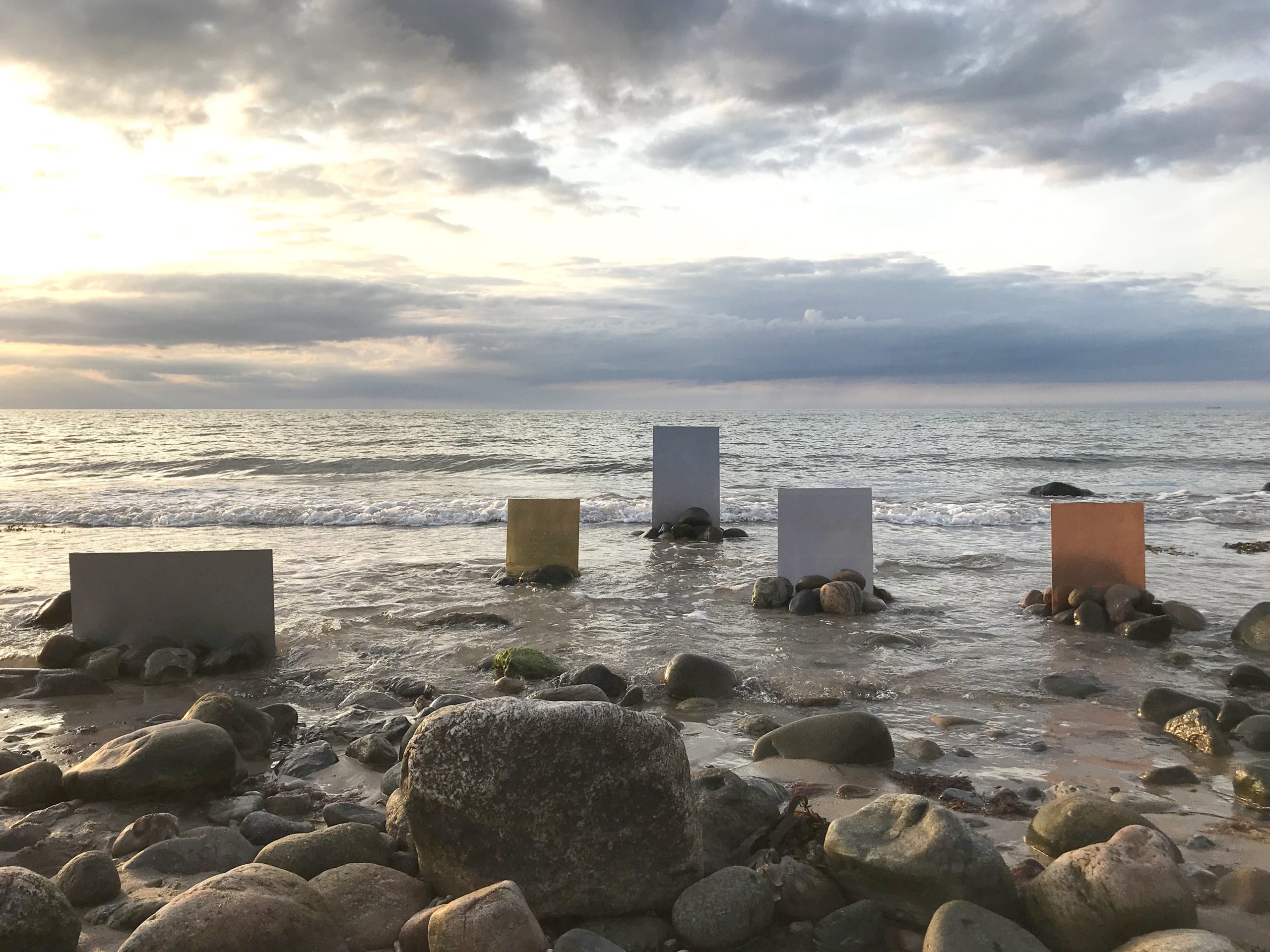
Rhoda: Very shortly after we started working with the more subtle archs of nature, we realized that we are actually very uninformed – and through journeys in this abstract landscape we have become very humbled by the vast amount of different kinds of consciousnesses we’ve come across. Thinking is not only a human trait – it goes on in so many places and takes so many forms. Like slime mold having a physical memory, how trees fight bacteria, or how mushrooms create a vast network of communication. Our western society doesn’t put much focus on other forms of intelligence, as there is an almost locked focus on humans in general, and therein a locked hierarchical understanding of life.
Mikkel: We’re constantly practicing getting into this understanding. It’s not easy, but through our stories, findings, works and research we hope to create some inspiration for our audience finding their own journey and relationship. Because there is no right or wrong in this, and it’s uncharted territory for our entire concept of being human.
Philosophical underpinnings
With all the mentioned considerations behind AMONGST RUINS it almost goes without saying that the ideas about the posthuman gaze and opening our limited perception as a species is not something Studio ThinkingHand incorporated into their work just for the occasion. The duo is deeply inspired by influential thinkers in more recent philosophy and criticism.
Rhoda: Recently we have been greatly influenced by critics like Rosi Braidotti, Karen Barad, Donna Haraway, Timothy Morton and Anna Tsing. Humanism is the paradigm in which society have evolved since early enlightenment years, basically normalizing a human centered arrogance in how we think, study, live and work, and it has been beneficial for a great deal of things, but it is getting to a point where the notion of what it is to be human is slowly cracking, both technologically, biologically and geologically.
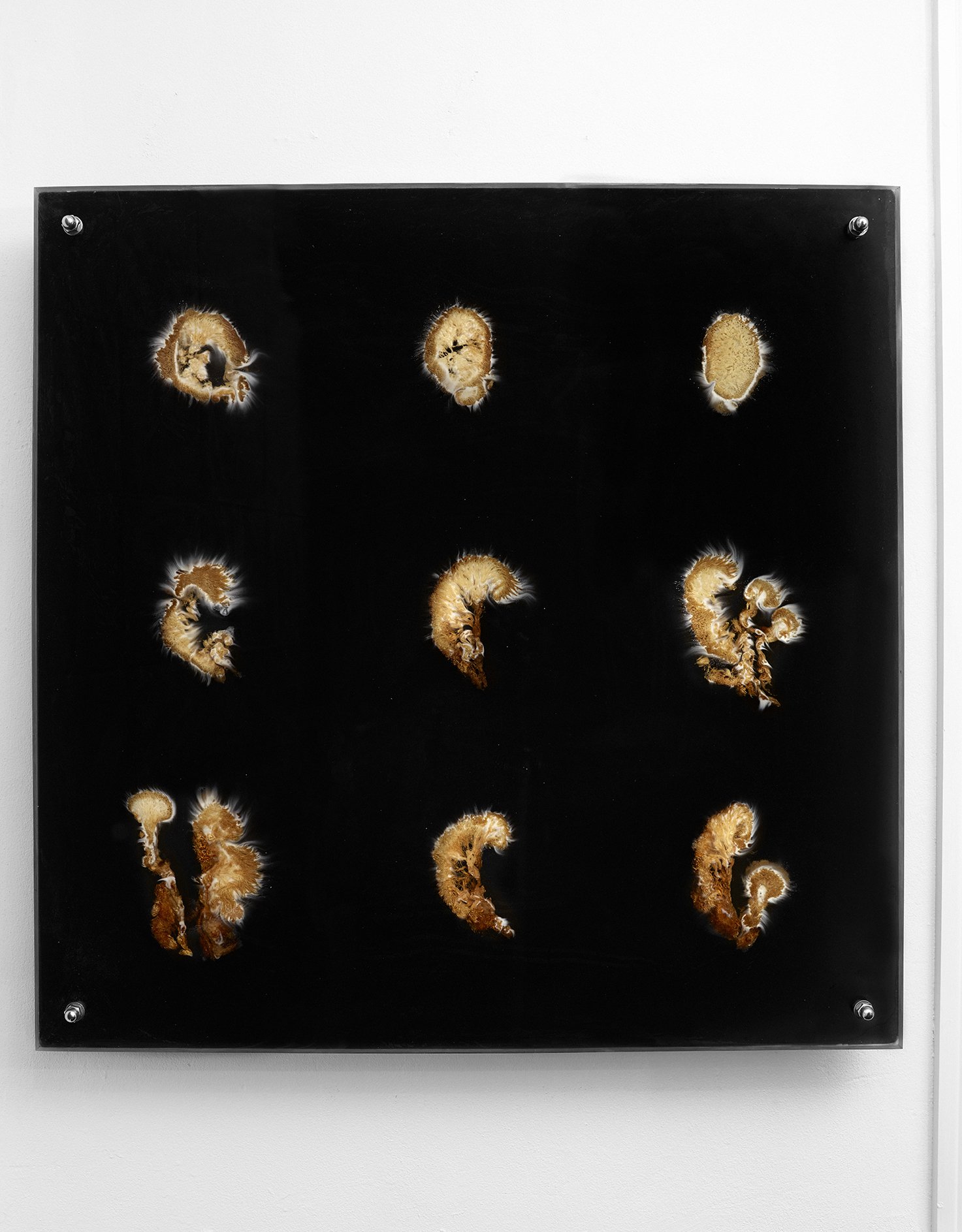
Rhoda: Think of our relationship with the planet at the moment – we’re no longer just a biological entity on earth, we’re a geological force which actions affect the planet directly – we can’t stay aloof to the fact that we are not able to sustain this kind of living, much less solve this problem with the language we used to create the problems in the first place. Posthumanist thinkers look to firmly challenge what defines us as human, and states that the concept of being human does not explain itself in culturally constructed ideals, such as the transcendental heterosexual upper-class white male character of Leonardo daVincis Vitruvian Man, but is a multi-directional and multi-facetted immanent species that is connected in, around and all inbetween.
Mikkel: To us posthumanism is not at all about disowning industrial development or technology and returning to a primal state, on the contrary, it’s about evolving beyond a frame where human advancement is polarized with nature in a dualist contradiction, but entails all. It’s basically about opening up to diversity of all kinds and accepting that not everything is here for us, for our consumption, commodification, use and at times we have to get used to being uncomfortable in a lower priority. The posthuman line of thought starts with shedding the fear of venturing into new waters. It’s practicing acute listening and curiosity. It is about sharing our questions. And of course it’s how we talk about the future.
A posthuman future
One of the most debated concepts in these years is sustainability, and I asked Rhoda and Mikkel to elaborate a bit on how they implement it in their artistic practice.
Mikkel: People tend to ask us if our work is about sustainability and of course we are concerned about it as many elements of the sustainability movement falls within a posthumanist framework but our practice does not start with sustainability. We’re very happy that some people are ecologically inspired by our work, but our main focus is from a philosophical perspective of how we relate to the world around us and less so on setting a doctrine or green rules and codes. The ecological discourse is definitely a part of our philosophical groundwork, but so is feminism, anthropocentrism, technology, marxism and holism. And what are we seeking to sustain anyway? An industrial and agricultural way of living that is ultimately destroying us that created this crisis to begin with? We hope to create an awareness to an overarching problem, that ultimately will also solve the ecological crisis but we look towards open ended affirmative narratives in the future rather than trying to reinstate old hierarchies.
Rhoda: We hope that through a philosophical shift from human centredness to a posthuman entanglement, change, respect and diversity can evolve in the future beyond the anthropocene.
It’s about transformation, seeing the entanglement of different forms. In zooming in, and zooming out – seeing the connectivity, embodied and embedded and letting these intra-actions better inform our actions.
Studio ThinkingHand’s recent exhibitions includes: Amongst Ruins solo exhibition, Wonderland Art Space, Frederiksberg, Denmark, 2018. Mycelium Moon, Vejle Kunstmuseum, Floating Art 2018, Vejle, Denmark, 2018 (Supported by The Danish Arts Council). Relationscape, Bloom Festival 2018, Frederiksberg, Denmark, 2018. In, Around and All Inbetween, Code Art Fair 2017, Bella Centeret, Denmark, 2017. Membrane, Festival of Future Nows, Hamburger Bahnhof – Museum für Gengenwart, Berlin, Germany, 2018. Network, Roskilde Festival 2018, Roskilde, Denmark, 2018.
Ongoing and upcoming exhibitions: group exhibitions at Alice Folker Gallery and Space10, solo exhibition at KVIT gallery during Art Week Copenhagen.
Later this year, Studio ThinkingHand will be on a 3 month residency with Seoul Museum of Art in South Korea.
You can check out studiothinkinghand.com and follow them on Instagram: @studiothinkinghand
Interview: Kamila Dzierzak
Thumbnail image: Quantum Field – Studio ThinkingHand
Banner image: Mikkel Dahlin Bojesen and Rhoda Ting at the Amongst Ruins exhibition